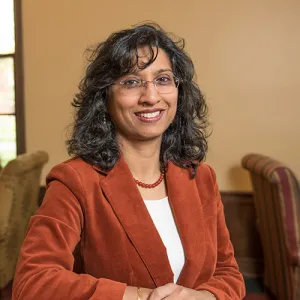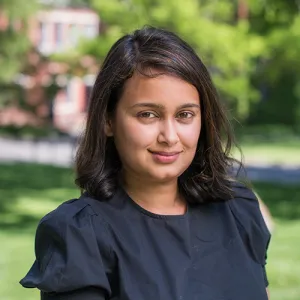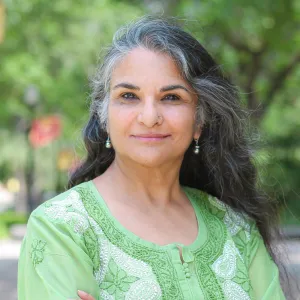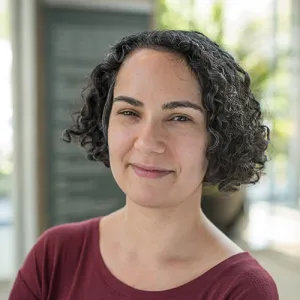
South Asian Studies
The minor in South Asian studies focuses on the interdisciplinary study of South Asia and its diaspora. It brings together the perspectives of various disciplines, from art history to philosophy and religion, from history and economics to sociology, anthropology, languages, and literary study, to create a sustained curricular focus on South Asian life, art, and culture.
South Asia comprises India, Pakistan, Bangladesh, Bhutan, Maldives, Nepal and Sri Lanka, and reaches out to Afghanistan, Burma and Tibet. It is home to the world’s highest mountains and to enormous ecological diversity. It is also home to more than one-fifth of the world's population and hundreds of languages. South Asia is the birthplace of Hinduism, Buddhism, Jainism and Sikhism, and more than one-third of the world’s Muslim population resides there. It has rich traditions of art, music and dance, and is renowned for its fiction and film. As a major contributor to global culture and economics, South Asia occupies an important position for understanding colonialism, postcolonialism and geopolitics.
Department Update
Keep Up-to-Date!
Stay informed about the latest news, events and opportunities in South Asian studies by signing up for our email list. Contact Phoebe McKinnell for more information.
Requirements & Courses
Minor in South Asian Studies
Requirements
Six courses (comprising at least 21 credits)
- An introductory course with a focus on South Asia
- Three courses, one from each of any three of the following categories:
- the visual, literary or performing arts
- history, philosophy or religions
- social sciences
- a South Asian language
- One elective, which could be an additional course or a special studies in any of the above-mentioned areas
- One advanced seminar in any discipline that addresses South Asia
Courses
SAS 201 Mother-Goddess-Wife-Whore: Female Sexuality and Nationalism in South Asian Cinema (4 Credits)
This course examines the relationship between female sexuality and nationalism in South Asian cinema, focusing on the crucial role that gender plays in the formation of postcolonial national identities, both on screen and beyond. The class considers diverse forms of cinematic resistance, especially the work of directors who challenge gender norms. Students look at films from Bollywood and from Bangladesh, Pakistan, Sri Lanka, Nepal, Bhutan and Afghanistan. The class includes guest-lectures by South Asian activists and filmmakers. (E) {A}{H}{S}
Fall, Spring, Variable
Crosslisted Courses
ANT 274 The Anthropology of Religion (4 Credits)
What can anthropologists teach us about religion as a social phenomenon? This course traces significant anthropological approaches to the study of religion, asking what these approaches contribute to our understanding of religion in the contemporary world. Topics include religious experience and rationality; myth, ritual and magic; rites of passage; function and meaning; power and alienation; religion and politics. Readings are drawn from important texts in the history of anthropology and from contemporary ethnographies of religion. {S}
Fall, Spring, Alternate Years
BUS 253 Indo-Tibetan Buddhist Philosophy and Hermeneutics (4 Credits)
This intensive course is taught at the Central University of Tibetan Studies in Sarnath, India, as part of the Hampshire/Five College in India program. Students take daily classes, taught by eminent Tibetan scholars, in Buddhist philosophy, Indo-Tibetan hermeneutics and Tibetan history and culture, and they attend regular discussion sessions as well as incidental lectures on topics including Tibetan art history and iconography, Tibetan astrology and medicine and Tibetan politics. Students also visit important Buddhist historical sites and explore Varanasi, one of the oldest continuously inhabited cities in the world. Each student is paired with a Tibetan student "buddy" to get an inside view of Tibetan culture. No prerequisites. Enrollment limited to 15. Application and H/5CIP permission required. {H}{N}{S}
Interterm, Variable
ECO 211 Economic Development (4 Credits)
An overview of economic development theory and practice since the 1950s. Why have global economic inequalities widened? What economic policies have been implemented in the developing countries of Asia, Latin America, Africa and the Middle East in search of economic development, what theories underlie these policies, and what have been the consequences for economic welfare in these regions? Topics include trade policy (protectionism versus free trade), financial policy, industrial development strategies, formal and informal sector employment, women in development, international financial issues (lending, balance of payments deficits, the debt and financial crises), structural adjustment policies and the increasing globalization of production and finance. Prerequisites: ECO 150 and ECO 153. {S}
Fall, Spring, Annually
ECO 311in Seminar: Topics in Economic Development-India (4 Credits)
This seminar applies and extends microeconomic theory to analyze selected topics related to India’s economic development. Throughout the course an emphasis is placed on empirically testing economic hypotheses using data from India. In particular, the following topics are explored, with reference to India’s growth and development: education, health, demographics, caste and gender, institutions, credit, insurance, infrastructure, water and climate change. Prerequisites: ECO 220 and ECO 250. ECO 211 or ECO 213 recommended. Restrictions: Juniors and seniors only. Enrollment limited to 12. Instructor permission required. {S}
Fall, Spring, Variable
ENG 241 The Empire Writes Back: Postcolonial Literature (4 Credits)
Introduction to Anglophone fiction, poetry, drama and memoir from Africa, the Caribbean and South Asia in the aftermath of the British empire. Concerns include the cultural and political work of literature in response to histories of colonial and racial dominance; writers' ambivalence towards English linguistic, literary and cultural legacies; ways literature can (re)construct national identities and histories and address dominant notions of race, class, gender and sexuality; women writers' distinctiveness and modes of contesting patriarchal and colonial ideologies; and global diasporas, migration, globalization and U.S. imperialism. Readings include Achebe, Adichie, Aidoo, Dangarembga, Walcott, Cliff, Rushdie, Ghosh, Lahiri, Hamid and others. {L}
Fall, Spring, Variable
ENG 277 Postcolonial Women Writers (4 Credits)
A study of 20th-21st century women writers in English from Africa, South Asia and the Caribbean. Students read a variety of genres in their historical, cultural and political contexts, to address questions such as: how have women writers addressed the challenges of contesting sexism and patriarchy from within their home cultures as well as the impacts of western imperialism? How have they combined feminism with anti-colonialism, and addressed issues of race, class, gender, sexuality or nationhood, war, migration and diaspora? How have they deployed the act of writing as cultural work? Writers include Adichie, Aidoo, Cliff, Desai, Emecheta, Hosain, Kincaid, Satrapi and Zadie Smith. Prerequisite: one WI course. {L}
Fall, Spring, Variable
ENG 333jl Seminar: Topics: A Major Writer in English-Jhumpa Lahiri (4 Credits)
Indian American writer Jhumpa Lahiri became an overnight star in 1999 with her first short story collection, the Pulitzer Prize-winning Interpreter of Maladies. She has since published many novels, story collections and essays. Internationally acclaimed for her beautifully crafted, deeply moving fiction about migration, love, loss, belonging, unbelonging, home and family, this trilingual twenty-first century writer has already generated an astonishing body of scholarship. This course focuses on Lahiri’s fiction and non-fiction, her themes and techniques, and includes her recent work in translation. The intersectionality of race, ethnicity, gender and class is central to the analysis. Supplementary readings include postcolonial, Asian American and feminist theory, history and literary criticism. Restrictions: Juniors and seniors only. Enrollment limited to 12. Instructor permission required. {L}
Fall, Spring, Variable
ENG 391 Seminar: Contemporary South Asian Writers in English (4 Credits)
This course explores the rich diversity of late 20th and 21st century literatures written in English and published internationally by award-winning writers of South Asian descent from the U.S, Canada, Britain, India, Pakistan, Sri Lanka and Bangladesh. These transnational writers include established celebrities (Salman Rushdie, Jhumpa Lahiri, Amitav Ghosh, Kiran Desai) and newer stars (Monica Ali, Aravind Adiga, Mohsin Hamid, Kamila Shamsie). Among many questions, the class considers how writers craft new idioms and forms to address multiple audiences in global English, and how they explore or foreground emergent concerns of postcolonial societies and of diasporic, migrant or transnational peoples in a rapidly globalizing but by no means equalizing world. Supplementary readings on postcolonial theory and criticism. Restrictions: Juniors and seniors only. Enrollment limited to 12. Instructor permission required. {L}
Fall, Spring, Variable
ENV 327 Seminar: Environmental Justice & Decolonial Aspirations in an Urbanizing World (4 Credits)
This course explores global environmental justice and decolonial planning issues, debates and policies in the context of an urbanizing world marked by race, gender, nationality, ethnicity, caste, class and other lines of difference. The course draws from scholarship in urban studies, anthropology, sociology, geography and other related fields to develop an appreciation of global environmental injustices. With particular attention to decolonial planning approaches, students learn about efforts to redress environmental injustices, whether through formal planning and policies, social movements, community organizing or everyday environmentalism. The course covers environmental issues at multiple scales from around the world and explores the interrelatedness of themes. Prerequisite: ENV 101. Priority given to ENV majors. Restrictions: Juniors and seniors only. Enrollment limited to 12. Instructor permission required.
Spring
HST 201 The Silk Road and Premodern Eurasia (4 Credits)
An introduction to major developments and interactions among people in Europe and Asia before modernity. The Silk Roads, long distance networks that allowed people, goods, technology, religious beliefs and other ideas to travel between China, India and Rome/Mediterranean, and the many points in between, developed against the backdrop of the rise and fall of steppe nomadic empires in Inner Asia. We examine these as interrelated phenomena that shaped Eurasian encounters to the rise of the world-conquering Mongols and the journey of Marco Polo. Topics include: horses, Silk and Steppe routes, Scythians and Huns, Han China and Rome, Byzantium, Buddhism, Christianity and other universal religions, Arabs and the rise of Islam, Turks, Mongol Empire, and medieval European trade, geography and travel. Enrollment limited to 40. {H}
Spring
MUS 101 World Music (4 Credits)
Music may not be a "universal language," but it is a universal phenomenon; every culture has something that is recognized as music. This course introduce a number of musical systems--traditional, classical and popular--from around the world and uses case studies to explore the complex relationships between music and culture. By engaging with music analytically, as musicologists (paying attention to the sounds heard) and ethnographically, as anthropologists (paying attention to the cultural context), students learn basic principles that enhance their understanding of music globally speaking. No prerequisites. {A}{S}
Fall, Spring, Variable
MUS 249/ REL 249 Colloquium: Islamic Popular Music (4 Credits)
Offered as MUS 249 and REL 249. Music is a complex issue in many Islamic societies. There are tensions between those who believe that music has no place in Islam and try to prohibit it, those for whom it is a central component of mystical devotion, and those who tolerate it, albeit within well-defined parameters. The debate intensifies in the case of popular music, a core part of the self-identification of young people everywhere. Despite this, there is an amazing variety of vibrant popular music throughout the Islamic world. This course explores the religious debates over music and the rich musical tradition (including religious music) in Islam. Enrollment limited to 35. {A}{H}
Fall, Spring, Variable
PHI 108/ REL 108 The Meaning of Life (4 Credits)
Offered as REL 108 and PHI 108. This course asks the big question, "What is the Meaning of Life?" and explores a range of answers offered by philosophers and religious thinkers from a host of different traditions in different eras of human history. We explore a variety of forms of philosophical and religious thinking and consider the ways in which philosophical and religious thinking can be directly relevant to our own lives. {H}{L}
Fall, Spring, Variable
PHI 127 Introduction to Indian Philosophy (4 Credits)
An introduction to the two-thousand-odd years of philosophy on the Indian subcontinent, focusing on central texts and topics: the nature of self, mind and reality; knowledge and its acquisition; morality and meaning; language and aesthetics. Students read selections of primary texts in translation, such as the Upanishads, the Bhagavad Gita, Milinda's Questions, the Nyaya Sutras and others. The course focuses on premodern Indian philosphy but includes some modern Indian thought, especially that which reflects on the relationship between modern and traditional ideas in the subcontinent. {H}
Fall, Spring, Variable
PHI 253bb/ REL 253bb Topics in Indian Philosophy-Buddhists and Brahmins (4 Credits)
Offered as PHI 253bb and REL 253bb. Buddhists and Brahmanical thinkers were frequently philosophically at odds with each other in premodern India. They disagreed over what reality is and how it can be known as well as how one can think and talk about it. This course focuses on key debates between these groups in order to appreciate the range of positions within both Buddhist and Brahmanical philosophy. Discussions may include: whether there is a self or a God, what words refer to, what can be known through language, the relationship between language and inference. Prerequisite: One PHI course. {H}
Fall, Spring, Variable
PHI 310cs Seminar: Topics in Recent and Contemporary Philosophy-Cosmopolitanism (4 Credits)
What does it mean to be a cosmopolitan person -- a global citizen? Can one simultaneously construct one's identity in terms of one's nationality, gender, ethnicity or other more local forms of community, and be truly cosmopolitan? If so, how? If not, which is the better approach? Is there one distinctive way of being cosmopolitan, or might there be varieties of cosmopolitanism arising in different cultural contexts, for instance, under colonial rule or conditions of exile? Is it self-evidently true that being a cosmopolitan person is a good thing for an individual or a society? What are some of its challenges? Students read essays by Kant, Mill, Nussbaum, Rawls, Rorty, Naipaul, Said, Tagore, Gandhi, Appiah and others with a view to examining and assessing different answers that have been proposed to these and related questions. Restrictions: Juniors and seniors only. Enrollment limited to 12. Instructor permission required. {H}{L}{S}
Fall, Spring, Variable
PHI 330sc Seminar: Topics in the History of Philosophy-Schopenhauer and Indian Philosophy (4 Credits)
Arthur Schopenhauer (1788-1860) was the first important European philosopher to take Indian philosophy seriously. He follows Kant’s transcendental idealism but places Kantian philosophy in dialogue with the Vedānta and Buddhist philosophy filtering into Europe as German and British orientalism began to flourish, synthesizing Kantian and Indian idealism. This course explores the Indian roots of Schopenhauer’s thought, the 19th century transmission of Indian ideas to Europe in which he participates, and the ways he uses Indian philosophy to advance a post-Kantian philosophical program. Prerequisite: a course in early modern European philosophy or a course in the history of Indian philosophy. Restrictions: Juniors and seniors only. Enrollment limited to 12. Instructor permission required. {H}{S}
Fall, Spring, Variable
REL 120 Nonviolent Protest (4 Credits)
“Nonviolence is the answer to the crucial moral and political questions of our time,” claimed Martin Luther King, Jr. What is the power of nonviolent protest? What does it do for protesters and their communities? Can it really change the world? This course examines nonviolent protest—its history, methods, spiritual commitments, promises, and limitations. Topics include Gandhian mass mobilizations, Civil Rights marches, Chicano-led farmworker strikes, antinuclear sit-ins, pro-democracy community organizing, Indian farmers’ encampments, and recent protests on college campuses. Class materials include speeches, films, manifestos, poems, posters, songs, archival documents, academic articles, and meetings with activists. (E) {H}{S}
Fall, Spring, Variable
REL 171 Contemporary Hinduism (4 Credits)
This course is an introduction to the ideas and practices of contemporary Hinduism in India, with an emphasis on how these traditions have shaped—and been shaped by—culture and politics. The class discusses various gods and goddesses, saints and shrines, rituals and ceremonies, radicals and reformers, as well as the ways Hinduism has engaged with inequality, caste and nationalism. Students consider philosophical writings, ritual texts, devotional poetry, comic books, legal treatises, feminist manifestos and personal memoirs, as well as ethnographic and popular films. This course has no prerequisites. {H}{L}
Fall, Spring, Variable
REL 275 Religions of Ancient India (4 Credits)
This course is an introduction to the literature, thought and practice of religious traditions in India, from ancient times to the medieval period. Readings include materials from the Vedas, Upanishads and epics, from plays and poetry, as well as Buddhist and Jain literature. Particular consideration is given to the themes of dharma, karma, love and liberation as they are articulated in Classical Hinduism. {H}
Fall, Spring, Variable
REL 280 South Asian Visual Culture (4 Credits)
How does one make sense of what one sees in South Asia? What is the visual logic behind the production and consumption of images, art, advertising and film? This course considers the visual world of South Asia, focusing on the religious dimensions of visuality. Discussions include the divine gaze in Hindu and Buddhist contexts, the role of god-posters in religious ritual and political struggle, the printed image as contested site for visualizing the nation and the social significance of clothing and commercial films in colonial and contemporary India. Students also work closely with holdings from the Smith College Art Museum.
Fall, Spring, Variable
SOC 236 Beyond Borders: The New Global Political Economy (4 Credits)
This course introduces students to the basic concepts and theories in global political economy. It covers the history of economic restructuring, global division of labor, development, North-South state relations, and modes of resistance from a transnational and feminist perspective. Issues central to migration, borders and security, health, and the environment are central to the course. Prerequisite: SOC 101. Enrollment limited to 35. {S}
Fall, Spring, Annually
SOC 237 Gender and Globalization (4 Credits)
This course engages with the various dimensions of globalization through the lens of gender, race and class relations. We study how gender and race intersect in global manufacturing and supply chains as well as in the transnational politics of representation and access in global media, culture, consumption, fashion, food, water, war and dissenting voices. Prerequisite: SOC 101. Enrollment limited to 25. {S}
Fall, Spring, Annually
SOC 327 Seminar: Global Migration in the 21st Century (4 Credits)
This course provides an in-depth engagement with global migration. It covers such areas as theories of migration, the significance of global political economy and state policies across the world in shaping migration patterns and immigrant identities. Questions about imperialism, post-colonial conditions, nation-building/national borders, citizenship and the gendered racialization of immigration intersect as critical contexts for our discussions. Prerequisite: SOC 101. Restrictions: Juniors and seniors only. Enrollment limited to 12. Instructor permission required. {S}
Fall, Spring, Alternate Years
SWG 230 Gender, Land and Food Movements (4 Credits)
The class begins this course by working alongside Gardening the Community, a youth-based and anti-racist food and land movement in Springfield, MA. Students center their studies on both regional and transnational women’s movements across the globe to develop their understanding about current economic trends in globalization processes. Through the insights of transnational feminist analysis, students map the history of land and food to imagine a more equitable present and future. Students develop a community-based research project that spans issues of climate change, environmentalism, critical race analysis and feminism. Prerequisite: SWG 150. {H}{S}
Fall
SWG 300wk Seminar: Topics in the Study of Women and Gender-Feminist Ways of Knowing (4 Credits)
This course explores feminist learning as an endless movement by centering the praxis, politics and poetics of collective knowledge production. How do one know what one knows? Who and what are served by that knowledge? How might a commitment to anti-coloniality and justice push one to imagine, make and move differently in relation to structures of violence that one seeks to transform? Students dive into these questions by engaging with over 25 years of organizing and co-creativity inspired by the Sangtin movement and Parakh Theater in India, and they make connections with these through embodied activities in the classroom. Prerequisite: SWG 150. Restrictions: Juniors and seniors only. Enrollment limited to 12. Instructor permission required. {A}{S}
Fall, Spring, Variable
WLT 214 Moonlit Lovers and Bloodstained Kings: Premodern Indian Literature (4 Credits)
Lovers meet in a moonlit grove, away from prying eyes. Kings dripping with blood loom over battlefields strewn with fallen enemies. Narratives full of intrigue and pathos abound in the premodern literatures of India and in this class students become sahṛdayas (“those with heart”)— sensitive readers and connoisseurs of these compelling tales. The course uses Indian literary and poetic theory to build a critical toolbox to analyze readings. Primary sources range from the fifth century BCE until the sixteenth century CE in a variety of India’s languages including Sanskrit, Tamil, Telugu, Kannada, and Rajasthani. Though the focus is on premodern materials, the course explores these texts’ enduring legacies in contemporary art, culture, and politics. (E) {L}
Fall, Spring, Alternate Years
Faculty
Contact South Asian Studies
Wright Hall 106
Smith College
Northampton, MA 01063










